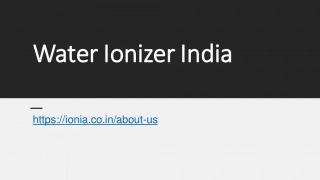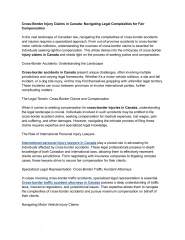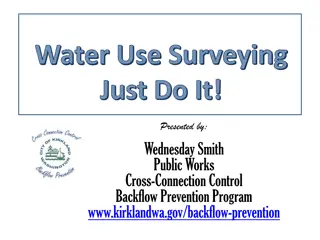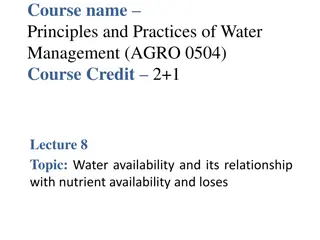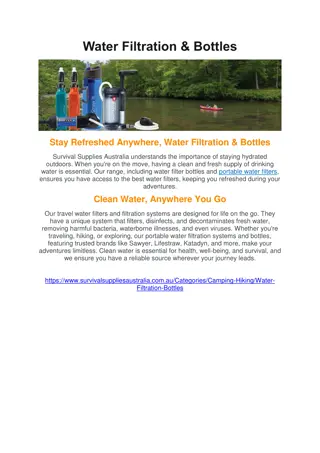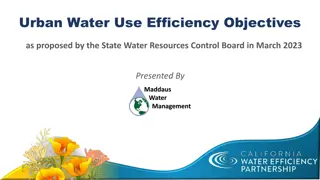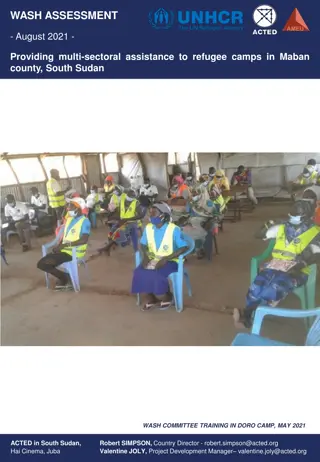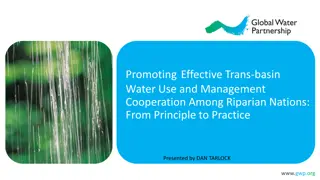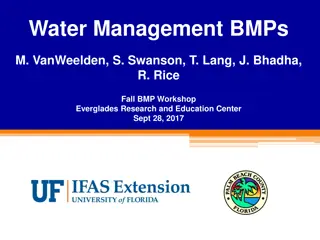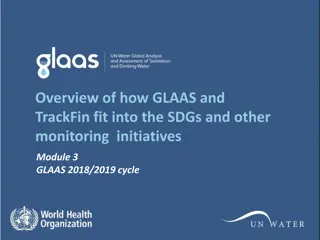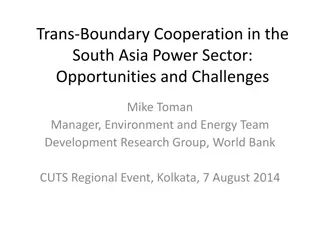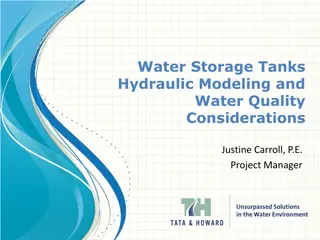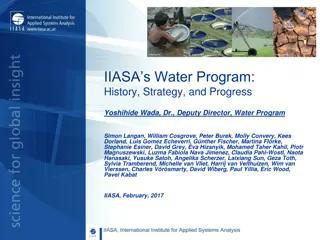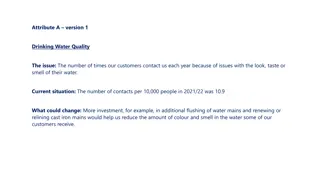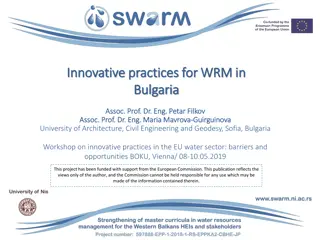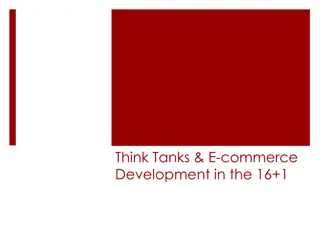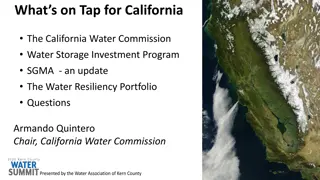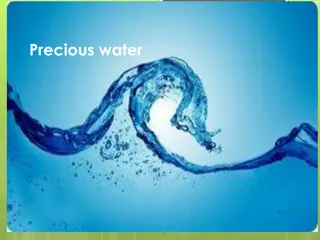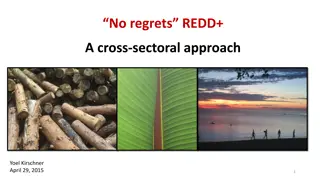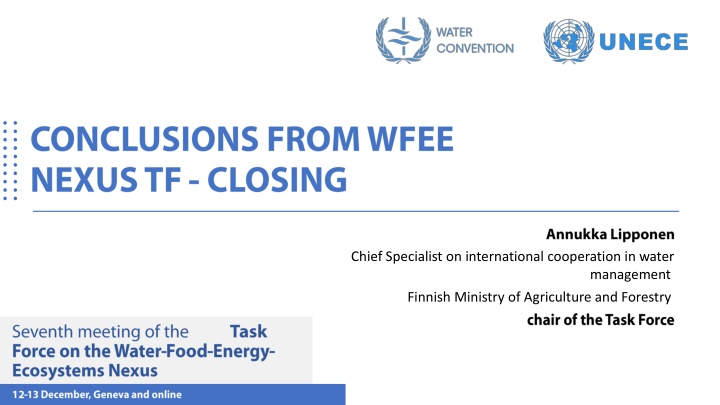
Cross-Sectoral Cooperation and Water Management
Lessons learned from various regional bodies and initiatives in advancing cross-sectoral cooperation in water management, with a focus on the Transboundary Nexus Assessment Methodology (TBNA) and integrated planning tools available for basins. The content highlights experiences, guidelines, and practical examples of cross-sectoral investment programs, institutional reforms, and the development of a shared vision for water security. Additionally, insights on the economic and financial rationale for nexus investments are discussed based on the GEF-IW portfolio and the need for evidence-based cooperation to promote regional integration and stability.
Download Presentation

Please find below an Image/Link to download the presentation.
The content on the website is provided AS IS for your information and personal use only. It may not be sold, licensed, or shared on other websites without obtaining consent from the author. If you encounter any issues during the download, it is possible that the publisher has removed the file from their server.
You are allowed to download the files provided on this website for personal or commercial use, subject to the condition that they are used lawfully. All files are the property of their respective owners.
The content on the website is provided AS IS for your information and personal use only. It may not be sold, licensed, or shared on other websites without obtaining consent from the author.
E N D
Presentation Transcript
Chief Specialist on international cooperation in water management Finnish Ministry of Agriculture and Forestry
The Transboundary Nexus Assessment Methodology (TBNA) developed under the guidance of this Task Force (a collective effort of countries and int l orgs) The TBNA and a whole set of tools for integrated assessments and planning are available: nexus community : GIZ platform Home | Nexus - The Water, Energy & Food Security Resource Platform (water-energy-food.org) transboundary water community of practice GEF-IWLEARN platform IW:LEARN | Home (iwlearn.net) (there is experience of nexus integration in the TDA-SAP process e.g. Amazon basin) TBNA can be applied to any type of basin Similar approaches or adaptations of TBNA exist, e.g. the capacity building material for Central Asia (DKU), ICIMOD s landscape approach, NBA/GIZ s nexus dialogue in the Niger River Basin
Experience from RBOs in advancing cross-sectoral cooperation through governance or through specific activities such as cross-sectoral investment plans evolution of cross-sectoral cooperation over time (OMVS) institutional reform to better tackle energy issues (EC-IFAS) nexus guidelines for projects just approved by council of Ministries (NBA) cross-sectoral investment program (Sava Drina Corridor Program & ISRBC/regional component) transboundary + cross-sectoral Water Fund in the Trifinio (El Salvador)
Lessons learned form GEF-IW portfolio, including: development as a driver for cooperation need for a shared vision tools need to be flexible / fit for purpose (e.g. flood and drought response) closer cooperation of RBOs with regional economic commissions objective: water security for regional integration, stability and peace There is much more to do e.g. need to strengthen the economic and financial case for nexus investments / evidence-base for benefits of cooperation (Central Asia IKI project s main objective)
Handbook not prescriptive, a compendium of experiences via case studies, offers practical tools -> Brief for policy makers coming up Combining water allocation and nexus broadens the scope for action. Adaptable allocation agreements Experience shared with the Task Force: Regional workshop on Central Asia (Nov 2022) nexus approach also featured (IWAC/Kazakhstan, Finland, UNECE, and Switzerland) outcome document: lines of actions for the region Drina Study on flow regulation a practical case of reconciling different needs, proposing different options for formalization of flow regulation (see the Drina Nexus Assessment by UNECE and GWP-MED and Handbook)
Increasing recognition of the central role of ecosystems in the WFEE nexus Transboundary basins are (complex) ecosystems in themselves Research is advancing (on biosphere and on society/economics) because there is a lack of scientific data & methods to integrate ecosystems in nexus and sectoral policies Network on Water-Energy-Food Nexus for a low-carbon economy in Europe and beyond (University of Oulu, University of Florence) First thematic assessment of the interlinkages among biodiversity, water, food and health (IPBES) Political commitment to tackle ecosystems related issues is increasing the new Climate deal (COP27) refers to Water in relation to preservation of Ecosystems; one day at COP was dedicated to Biodiversity. COP15 of CBD is drawing attention to the concerns about degrading biodiversity
Sustainable Water-Energy Solutions Network (UNDESA and ITAIPU) - a platform for knowledge, experience sharing, capacity building Includes UN agencies, international & regional organizations, private sector For transboundary solutions, synergies with the Nexus Task Force under the Water convention UNECE continues to support water-energy policy development join the Group of Experts on Renewable Energy, the Task Force on Energy transition on Central Asia Water and Energy at the 2023 UN Water Conference (and beyond). Which are the most important issues on water-energy? We need to mainstream also water into energy discussions, for a conferences, strategies, policies etc.

